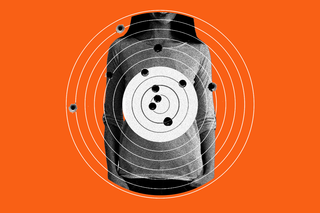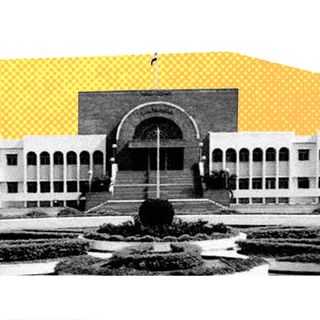
Terrorism Definitions Exclude Gender, Neglecting Incel Extremism: Study
Traditional risk assessments have a gender blind spot — making gendered forms of extremism harder to predict and prevent.

Incel — or ‘involuntary celibate’ — ideology is massively popular online, incel characters are standouts in cinema, and on the ground, incels have been responsible for some of the most extreme instances of violencein recent times. Despite their omnipresence, however, instances of incel violence are often downplayed as isolated, lone-wolf incidents instead of being recognized as part of a larger collective movement. New research published last month in the journal Violence Against Women highlights how current definitions of gender-based violence and terrorism fail to identify the extent of the dangers of the incel movement.
While the incel movement originated from a perceived denial of sex, Esli Chan, who authored the current study, highlights in their study how the current scope of the incel movement has moved beyond simply sexual entitlement. It’s no longer about individuals being owed sex – it’s about deepening the patriarchal social structure to reinforce male dominance.
Chan writes, “Existing literature and institutional definitions of online gender-based violence focus on the sexualization of harm or cyberbullying of young women; however, this study demonstrates that emerging forms of online gender-based violence are not always sexual and are rooted in fundamental beliefs that seek to establish gendered dominance.” In her research on incel forums and subreddits, Chan observed large prevalence of posts speaking about gender roles and male supremacy, features which are often missed in current definitions of online harassment of women.
Incels — or involuntary celebates — are a global community of (mostly) men united by the internet, holding the shared belief that the refusal of women to share sexual intimacy with them is an oppression against men. Chan notes in her research, “Incels combine an entitlement to sex with self-deprecation and perceptions of victimization by women… perceive masculinity as superior, difficult to earn, and often challenged… believe that women’s refusal to grant sexual intimacy to certain men is a threat and form of oppression against men.”
While the incel community largely operates through online media, physical manifestations of incel ideology have resulted in some horrific incidents in the last few years. In 2021, Jake Davison, a 22-year-old incel, was involved in a mass shooting in Plymouth, USA, that claimed five lives. In 2018, Alek Minassian of Toronto killed ten pedestrians — eight of them women — by driving a van through them. Even earlier, in 2014, sexually frustrated Elliott Rodger of Santa Barbara went on a shooting spree, killing six people and wounding fourteen more. Chan notes in her research how online forums revere Rodger as “Saint Elliott.” Minassian hailed him as the “Supreme Gentleman.”
The online sphere also has seen a manifold increase in the rise of violence tendencies among incels in the last few years. A report in The Guardian notes that in 2016 incel forums on average clocked around 112 instances of the use of violent misogynistic terms alongside action words such as “stab”, “punch”, “shoot”, or “attack” daily. In 2022, that number has risen to 849. Thus the increasing violence of the incel community is a growing threat to society and must be recognized as terrorism.
Related on The Swaddle:
Looksmax, Redpill, Femoid: Dissecting Incel Language and Ideology
Chan also highlights how current definitions and frameworks in understanding and predicting terrorism and extremism do not identify violent incel attacks as acts of terrorism or extremism. She identifies two reasons for it.
One, academic research on the incel movement as well as on gender-based violence are largely confined to the online space. Hence, the general understanding is that incels largely operate online, which leads to instances of physical incel violence being downplayed. Chan writes, “incel actors that act on violence against women are largely supported and emboldened by their online communities. The dismissal of online networks in connection to physical violence by lone-wolf actors minimizes the patterns of systemic violence against women.”
Two, current understandings of terrorism seldom identify the cause of establishing a gender hegemony as an ideology. The incel movement is globalized, but its ideology is tinged with white supremacy and religious bias, according to Chan. Predominantly white people who enact violence “are labeled as individual aggravated actors, or ‘lone wolves,’ and held to a lesser offense,” writes Chan.
Hence, while popular understanding of incels identifies the dangers of their ideology, in the legal sphere the existing frameworks are inadequate. They often fail to identify incel attacks as acts of terrorism or extremism, and they fail to classify online incel behavior as hate-speech and gender-based violence. The current study highlights the significance of identifying the incel movement as an extremist ideology.
It is important to note here that while it is necessary to identify the incel ideology as a terrorist movement, it is also equally imperative to recognize the overlaps between incel beliefs and other political movements. Identifying movements congruent with the incel ideology can help navigate political spaces better. Globally, inceldom as an ideological thought is far more prevalent in right-wing circles. Belief in a gendered society and striving for a male-hegemonic order also happen to be highlights of several conservative societies worldwide, hence incels are often popular figures among conservatives. In India, this could be seen in the “sulli deals” and “bulli bai” controversies, where people identifying as “Trads” — far-right “traditional” Hindus — organized bets on online photos of Muslim women. Similarly, ideologues who preach sympathy for incels, like Jordan Peterson, have a popular fanbase among right-wing circles. This is not to say that incels are exclusively right-wing. Sexist men and men’s rights movements exist in all political wings.
Incel radicalization is spreading rapidly, making both online and offline spaces increasingly unsafe for women and other genders. Identifying their ideology to its true extent can be the first step in tackling it.
Amlan Sarkar is a staff writer at TheSwaddle. He writes about the intersection between pop culture and politics. You can reach him on Instagram @amlansarkr.
Related


In‑Laws Asking Wife to Do Housework Is Not Akin to Treating Her ‘Like a Maid’: Bombay HC
